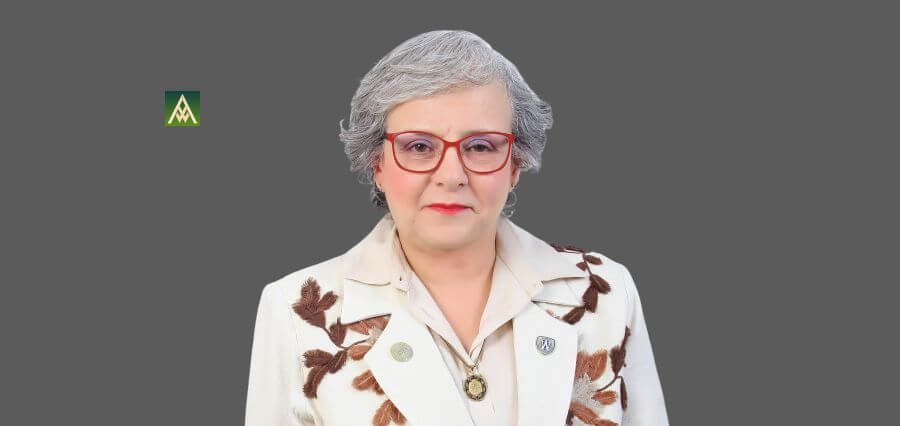With the constant pursuit of your goal, you can realize any dream that otherwise seems impossible at the beginning. Since her childhood, Ghada El-Mahdy always believed in herself and her dreams. She first became interested in civil engineering as a child in the UK, where her mother was doing her PhD degree in architecture at Manchester University, and Ghada felt that she could help support her mother’s initiative by becoming a civil engineer.
When they returned to Egypt in 1980, the country was celebrating the 1979 peace treaty with Israel, and there were plans to solve the urban congestion around the Nile Valley by planning new satellite cities in the desert, which would be much more ecumenical for the growing population of Egypt. “Also, I remember a train trip to Marsa Matrouh in 1982, where I was enthralled by the vast coastline that could be developed between the crowded beaches of Alexandria and the beautiful beaches of Marsa Matrouh. This vision did, in fact, come true over the years, with my mother contributing to it by being the consultant of two North Coast resorts,” she shares.
Becoming a Professional Engineer
With all these ambitious plans for Egypt’s development in mind, Ghada did not like the traditional education in Egypt, which was based mainly on memorization and dictation. She fought to go back to the British system of education, which is much more onward progressive. She did her GCE exams in 1983 and entered Ain Shams University’s Faculty of Engineering. Although she was impressed with the stout technical material she learned at Ain Shams University and excelled in her studies of civil engineering, Ghada got bored with the university in the final year and wished it was only a four-year programme rather than five.
On graduation, Ghada worked as a junior civil engineer at Arab Consulting Engineers (ACE) in Cairo for a year and a half. But she was distressed by the lack of development of engineers in Egypt and their state of poverty, although they were an essential part of the nation’s development.
In 1990, she went to Canada as a graduate student to get her M.A.Sc. and Ph.D. degrees from the University of Windsor (UoW) in Ontario. During her time at the UoW, Ghada learnt that engineering is a profession and that she should pursue a professional designation as well as an academic degree. So, she signed up as an engineer-in-training EIT with Professional Engineers of Ontario (PEO).
Overcoming the Early Obstacles
Ghada El-Mahdy finished her Ph.D. degree in 1997, majoring in structural stability, and she landed in Canada as a permanent resident. Then she went back to Egypt. Back in Egypt, she was not able to secure an academic position, which she greatly wanted, and was detained in Egypt. She went back to ACE in 1998 and worked on some challenging projects which required much attention to structural stability. As she was still an EIT in Canada, Ghada did not feel she was qualified to handle such problems without adequate supervision and truly felt the Egyptian engineering profession was poorly managed. Still wanting an academic position to be under the supervision of a professor rather than engineers, she applied to the Housing and Building Research Centre (HBRC) for a research position, which was finally granted in 2002. Unfortunately, Ghada’s major, structural stability, was not really supported in Egypt, and she still wanted to go back to Canada. In 2003, Ghada was invited to go to the University of Alberta (UoA) to do some research, and there she met with her PhD external examiner, who encouraged her to do some more work on her PhD research, which was a great relief. However, Ghada was asked to go to the UN in New York as an engineer in the Department of Peacekeeping Operations (DPKO) at the time of the start of the war in Iraq. Ghada recalls, “My biggest obstacle at the UN was that the position given to me, head of the engineering section, was a P5 position which required I have a professional designation in engineering, as I was only an EIT and the position was contested by another staff member who also did not have a professional designation but had more experience than I in the UN, I receded the right to the position, although I was more qualified, and eventually left the UN a year later.”
A Determined Spirit
All these factors made Ghada El-Mahdy even more determined to get her professional designation in Canada (P.Eng.), appeal her landing case which had been revoked, and do some research in Canada. So, she went back to Alberta in 2004 and set out to achieve all these goals. She says, “I marveled at the difference in work experience in a professionally based nation and felt something just had to change in Egypt.” At this time, private universities in Egypt were beginning to be established, and Ghada had much hope that she would somehow find a position in one of these. She got her P.Eng. in 2006 and her Canadian citizenship in 2008 and published five papers in Canada and the USA. In 2009, Ghada El-Mahdy went back to Egypt to be promoted as an associate research professor at HBRC. She continued her research and started teaching at the Higher Technological Institute (HTI) part-time till she became a research professor in 2014.
In 2015, Ghada El-Mahdy joined the British University in Egypt (BUE) as a part-time professor, and in 2018, she became a full-time professor. She served as the head of the civil engineering department from 2020-23. In her role at BUE, Ghada El-Mahdy was assigned the task of pursuing the international professional accreditation of the civil engineering programme with the Joint Board of Moderators (JBM) in the UK, which required that 50% of the faculty become incorporated/chartered with one of the five professional institutions which constituted the JBM. So, she became a chartered member of the Institution of Civil Engineers (ICE) and later became a fellow in 2023 (CEng FICE). In 2024, Ghada El-Mahdy was elected as the ICE representative for Egypt.
Fulfilling the World’s Demand for Modern Engineering Professionals
As an ICE mentor, reviewer, and representative, Ghada El-Mahdy has mentored many students and young professionals as to the importance of gaining a professional qualification/designation. All developed countries have their own systems and professional designations to help develop their engineers and establish a method of regulating the profession. However, these are usually based on a local jurisdiction. The UK professional bodies, like the ICE, are internationally recognized and provide an excellent framework to collaborate internationally to provide the world with its needs for civil engineering professionals. Their aim is to satisfy the fast-evolving need for sustainable and resilient infrastructure, as required by the UN Sustainable Development Goals, and the challenges of climate change leading to the need to plan for net-zero carbon emissions.
Challenging the Status Quo
Sharing her experience about fostering a learning environment that balances rigor with empathy, especially in a demanding field like civil engineering, Ghada El-Mahdy says that in academia currently at the BUE, although they provide their students with a firm base for civil engineering, the graduating students are reluctant to get involved with the ICE and feel it is alien to the political situation in Egypt. In Egypt, there is a great stimulus for infrastructure, but the shaky economy does not foster accountability in a demanding field like civil engineering. Ghada El-Mahdy always advises her students and young engineers that to grow in their field, they must pursue professional qualifications, even if this challenges the status quo in Egypt.
Conquering Challenges
Further sharing her most challenging moment, Ghada El-Mahdy says that she has gone from the lecture hall to coordinator of international professional accreditation to head of the civil engineering department to ICE representative for Egypt. Her most challenging leadership moment was an investigation of a missing graphics card in a newly acquired workstation. This led to tedious disputes as to what is and is not acceptable behaviour in the eyes of national and institutional leadership, which eventually led to her stepping down from the head of the department’s position. “What I consider corruption is taken to be business in Egypt. I do not support the mishandling of funding or the fostering of a scapegoat policy as acceptable leadership.”
The New Age of Engineering
Engineering education today is rapidly shifting to digital transformation, sustainability, and interdisciplinary learning. Ghada El-Mahdy totally supports this move and has personally been involved with the redefining of BUE’s five-year engineering programs, which are based on classical methods of mainly hand drawings and calculations, to a framework of four-year engineering programmes, which address the rapid change in technology and the need to proceed speedily to get ahead of the curve. In an effort to discuss a Memorandum of Understanding between the ICE and the local authorities, which could establish a local professional qualification in Egypt, she met with the head of the Egyptian engineering syndicate.
She was flabbergasted to hear from him that this was such a big problem because the Egyptian engineer did not know the difference between a rectangle, a triangle, and a circle and that he was totally against engineering curriculums going from five years to four years. In today’s rapidly evolving technological world, it is not only unfair but also totally out of the question to designate the wonderful people responsible for Egypt’s rapidly developing infrastructure as totally incompetent.
Uplifting Egypt’s Civil Engineering
Talking about her legacy, Ghada El-Mahdy says it is to promote professionalism in civil engineering in Egypt. “I want my students to walk out into the world, ready to be responsible engineers, eager to be recognized as professional engineers, and determined to challenge all dimensions of corruption in Egypt.” Whether it be the poor social status Egypt’s regular salaries provide or the mind-boggling inflation in the cost of living due to exponential rises in the prices of living accommodation mainly caused by the devaluation of the Egyptian pound, she wants her students to evaluate the situation and find solutions rather than flee to other countries.
Setting Global Benchmarks in Education
As a professor at The British University in Egypt, according to Ghada, the BUE’s main unique advantage that distinguishes it from other universities in the region is that it offers a British-style education and a dual degree for most disciplines, one from an Egyptian university and one from a UK university. The BUE’s ethos is “Learning How to Think, Not What to Think.” In her opinion, this is a stride in the right direction to counteract the traditional method of education in Egypt of memorization and dictation. It will hopefully lead to an enlightened society, and in the case of engineering, the objective is that its graduates pursue lifelong learning and progress to become chartered engineers.
BUE has been evolving to meet the global benchmarks in education. The university’s strategic priorities align with Egypt’s national development goals and Egypt Vision 2030, which requires Egyptians to have a decent and dignified life. Ghada says at BUE, they incorporate the UNSDGs into their research work and teaching, and the university’s location, which is situated at the centre of several emerging satellite cities near the New Administrative Capital, makes infrastructure and sustainability of particular importance.
Bridging the Gap
There’s a growing emphasis on collaboration between academia and industry. Under Ghada’s academic leadership, BUE is bridging the gap to ensure its civil engineering graduates are not only knowledgeable but also industry-ready by raising their awareness of the importance of professional qualifications. Hopefully, this will help them integrate into international companies which offer better salaries than the local economy. This starts with her academic advisor position for BUE’s ICE Student Chapter for the students, as well as her mentoring and guidance of the faculty to reach chartered engineering status with the aim of claiming international professional accreditation status for their civil engineering programme.
Her Message to All Engineering Aspirants
Finally, as both a professor and a leader who has helped shape the foundation of many futures, Ghada’s message to future generations of female engineers across Egypt and the Middle East is to get involved with the international professional bodies around you. Women do make a difference in counteracting corruption and disputes. It is your responsibility to become responsible engineers and speak up against any inequity.




